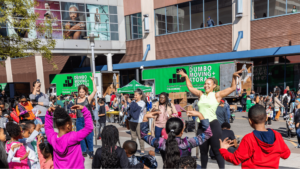Sponsorship of tours, festivals, and venues totaled nearly $1.5 billion in 2016. As a venue owner or manager, are you getting your share?
Of 50 venues we surveyed, more than a third are getting some music sponsorship revenue, and two-thirds want to increase revenue beyond ticket and bar sales.
So how can you attract sponsorships when festivals dominate the music sponsorship food chain? You have a couple advantages. Venues have programming all year long, rather than just a few days a year. With a steady stream of artists coming through, venues offer a more diverse audience for sponsors to present their brands to.
If your venue is new to the music sponsorship game, you might need to develop your sponsorship selling skills. Here are five steps to getting started.
1. Know your value
Before reaching out to prospective sponsors, you first have to understand the business opportunity you’re offering. You can illustrate the value of your venue and fans by gathering data from a variety of sources, such as:
- Ticket sales for attendance and total audience size
- Bar sales for total drink orders
- Audience demographics, including age and gender
- Social media reach, such as the number of followers and amount of engagement
- Email marketing reach, including the size of your list, open rate (the average for music events is 29%), and click-through rate (the average for the music industry is 5.43%)
Bar sales data is especially important for pitching alcohol brands. According to sponsorship company IEG, wine and spirits brands are are more than seven times more likely to sponsor music than the average of all sponsors. Non-alcoholic beverages and beer tie for second place.
2. Do your homework
When you approach a company about sponsoring your music venue, you’re offering a chance to solve problems for the prospective partner. So before you speak with them, you need to learn a little about the company and some of its business concerns.
- Know the company and its needs. Before reaching out, find out a little about the company. Has the company done sponsorships before? What are they trying to achieve? How can your shows and fans help them achieve it? Why would they want to sponsor you? Why wouldn’t they?
- Find the decision maker. Finding the right person to talk to about sponsorships involves some hustle on LinkedIn. You might find one connection that leads to another, that eventually leads to the decision maker. At each step, though, you can gain valuable advice and intelligence about how to approach the company about sponsorship.
3. Pick up the phone
In a 2017 survey of event creators, 42% said email was their preferred method for reaching out to sponsors. But phone calls can be much more effective, even when it’s a cold call. You’re already armed with your venue’s value proposition and knowledge about the prospective sponsor, so get to it.
- Use a script. To land just one or two sponsors you’ll need to make calls to multiple prospects. Using a script may sound like it would be unnatural, but it’s the best way to make sure you get your points across and questions asked without hemming and hawing. You’ll get better with practice.
- Practice. Even with a script, it may be a while before you’re completely comfortable with making calls. As with anything, it takes practice. Call your own phone and leave a message that you would leave a prospect. How did you sound? Do you sound upbeat and positive?
- Start small. Don’t call your best prospects first. Start with the less important ones on your list, like local businesses, before reaching out to big alcohol brands. By the time you’ve worked your way to the top of the list, your pitch will be more polished, and you’ll feel more confident.
4. Ask questions — it’s not all about you
When you first speak with prospects, you’ll be eager to tell them all the great things about your venue and your fans. But first, you’ve got to understand their needs.
- Be direct. Ask questions that show you’re interested in their success. This will make a positive first impression while helping you understand their needs and preferences.
- Show your interest in forming a true partnership. Don’t just think about the revenue you can get from sponsors. Instead, focus on the value and positive associations you’re able to provide.
5. Think long-term
When you’re trying to get a sponsor to agree, it’s for the long term, not just a single show. Once they’ve agreed to sponsor, treat the relationship like a commitment.
- Communicate results. A few weeks after your sponsor’s support begins, ask for a meeting to go over the results of their sponsorship. Start by going over stats. Use charts and graphs to show the number of fans who attended and their demographics, along with brand impressions, and out-of-the-venue stats such as social media reach.
- Request feedback. Be sure to ask sponsors what they loved, what they didn’t love, and if there’s anything you should be doing differently.
- Stay in touch. Don’t forget to thank them for their sponsorship, and ask for their continued support. Treat this like an ongoing relationship; maintain frequent contact, not just when you want them to commit.
To learn more about music sponsorship at venues, get The Future of Concert Sponsorship for Music Venues.






